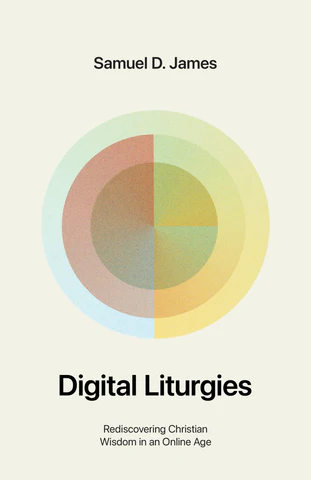
Samuel D. James
Reviewed by: Joshua A. Klein
Digital Liturgies: Rediscovering Christian Wisdom in an Online Age, by Samuel D. James. Crossway, 2023. Paperback, 208 pages, $16.99. Reviewed by OP elder Joshua A. Klein.
By this point in time, anyone who has been paying attention can see that there are ramifications of the technological way of life in which we all are enmeshed. The proliferation of books on a given subject is often a reliable indication of the concerns of the day, and amidst recent trends in Christian publishing, there are two subjects that seem to be growing in tandem: anxiety and technology. Though correlation is not causation, Samuel James’s new book, Digital Liturgies, convincingly shows us that the convergence is no coincidence.
Whereas most writers remain bogged down in the tech-optimist/tech-pessimist dichotomy, and as a result fall short of a satisfactorily robust framework for thinking about such a complex subject, James offers what he calls a “tech-realist” perspective. But his reframing is anything but middle-ground fallacy. James argues that although it is true that technological development is part of the cultural mandate, it does not follow that all technologies we develop will be conducive to human flourishing. An essential part of faithful technological stewardship is an honest assessment of our tools and the ways they shape us. And in fact, calling the internet a “tool” isn’t even all that correct, he argues. It’s better thought of as an “epistemological environment—a spiritual and intellectual habitat—that creates in its members particular ways of thinking, feeling, and believing” (9).
Inspired by James K. A. Smith’s insights into the “liturgical” formation of human life, the book is structured around five “digital liturgies” (authenticity, outrage, shame, consumption, and meaninglessness) that are commonplace in current social media experience. What I appreciate about James’s analysis is that he brings together several important emphases which are often neglected: the given goodness of embodied creaturely existence, the formative and ritual nature of human experience, the judicious insights of media ecologists, and an earnest call to develop Christian wisdom. Although one might assume these emphases would be staple fodder for such ruminations, most Christian technology theorists make the misstep of focusing exclusively on technological “content” rather than “form,” and in so doing they limit themselves to thinking either in terms of Christian liberty (“tools are neutral; it’s all about how you use them”) or legalistic prescriptivism (“taste not, touch not”). But both of these perspectives miss the fact that our daily habits are soul-forming, and therefore, we are talking about issues of wisdom, not specific biblical prescriptions.
Being as brief a book as it is, Digital Liturgies doesn’t say everything that can (or should) be said about the topic—say, for example, the biases and intentions of the social media companies (for that, see Chris Martin’s Terms of Service: The Real Cost of Social Media) or the economic context that propels the tech industry’s continued developments (which can be found in Craig Gay’s Modern Technology and the Human Future: A Christian Appraisal). Nevertheless, I do believe that James’s emphases are precisely what most twenty-first century evangelical and Reformed believers need to understand most clearly: by divine design, we are ritual creatures formed by our daily habits, and therefore we must submit our whole selves to the Lord: heart, soul, mind, and strength. From now on, when I’m asked about the faithful use of technology, this is the first book I will recommend.
November 16, 2025
November 09, 2025
November 02, 2025
October 26, 2025
October 19, 2025
October 05, 2025
Raising Sexually Faithful Kids and
Parenting Boys and Girls in a Gender-Confused World
September 28, 2025
© 2025 The Orthodox Presbyterian Church